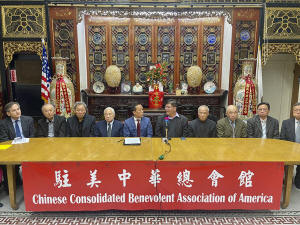Trump's attempt to end birthright citizenship would overturn more than a
century of precedent
 Send a link to a friend
Send a link to a friend
 [January 25, 2025]
By GRAHAM LEE BREWER and JANIE HAR [January 25, 2025]
By GRAHAM LEE BREWER and JANIE HAR
President Donald Trump has said since his first administration that he
wants to end birthright citizenship, a constitutional right for everyone
born in the United States.
This week he issued an executive order that would eliminate it, upending
more than a century of precedent. On Thursday, however, a federal judge
temporarily blocked it after 22 states quickly mounted a legal
challenge.
Over the years the right to citizenship has been won by various
oppressed or marginalized groups after hard-fought legal battles. Here’s
a look at how birthright citizenship has applied to some of those cases
and how the Justice Department is using them today to defend Trump’s
order.
Citizenship for Native Americans
Native Americans were given U.S. citizenship in 1924. The Justice
Department has cited their status as a legal analogy to justify Trump’s
executive order in court.
Arguing that “birth in the United States does not by itself entitle a
person to citizenship, the person must also be ‘subject to the
jurisdiction’ of the United States.” It raised a case from 1884 that
found members of Indian tribes “are not ‘subject to the jurisdiction’ of
the United States and are not constitutionally entitled to Citizenship,”
the department said.
Many scholars take a dim view of the validity of that analogy.

It’s not a good or even new legal argument, said Gerald L. Neuman, a
professor of international, foreign and comparative law at Harvard Law
School. “But it’s got a bigger political movement behind it, and it’s
embedded in a degree of openly expressed xenophobia and prejudice.”
Some say the legal analogy to the citizens of tribal nations plays
directly into that.
“It’s not a valid comparison,” said Leo Chavez, a professor and author
at the University of California, Irvine, who studies international
migration. “It’s using the heat of race to make a political argument
rather than a legal argument.”
“They’re digging into old, archaic Indian law cases, finding the most
racist points they can in order to win,” said Matthew Fletcher, a
professor of law at the University of Michigan and a member of the Grand
Traverse Band of Ottawa and Chippewa Indians. “There’s nothing sacred in
the Department of Justice. They’ll do anything they can to win.”
For Spanish and Mexican descendants
In addition to his order on birthright citizenship, Trump has directed
immigration arrests to be expanded to sensitive locations such as
schools. That holds special implications in the border state of New
Mexico, where U.S. citizenship was extended in 1848 to residents of
Mexican and Spanish descent under the Treaty of Guadalupe Hidalgo, which
ended the U.S.-Mexico war.
The state’s 1912 Constitution includes a guarantee saying “children of
Spanish descent in the state of New Mexico shall never be denied the
right and privilege of admission and attendance at public schools … and
they shall never be classed in separate schools, but shall forever enjoy
perfect equality with other children.”
State Attorney General Raúl Torrez has highlighted that provision in
guidance to K-12 schools about how to respond to possible surveillance,
warrants and subpoenas by immigration authorities. The guidance notes
that children cannot be denied access to public education based on
immigration status, citing U.S. Supreme Court precedent.

For enslaved people
The issue of whether enslaved people were eligible for U.S. citizenship
came to the forefront in 1857 when the Supreme Court ruled 7-2 against
Dred Scott, a slave, and his bid to sue for freedom. In their decision,
the court said Black people were not entitled to citizenship and even
claimed they were inferior to white people.
[to top of second column]
|

Members of the Chinese Consolidated Benevolent Association of
America sit during a news conference in the Chinatown district of
San Francisco on Friday, Jan. 24, 2025. (AP Photo/Haven Daley)

The Dred Scott decision contributed to the start of the Civil War.
With the North's victory over the South, slavery became outlawed.
Among the constitutional protections put in place for formerly
enslaved people, Congress ratified the 14th Amendment in 1868,
guaranteeing citizenship for all, including Black people.
“All persons born or naturalized in the United States and subject to
the jurisdiction thereof, are citizens of the United States and of
the State wherein they reside,” the 14th Amendment says. “No State
shall make or enforce any law which shall abridge the privileges or
immunities of citizens of the United States.”
That effectively nullified the Dred Scott ruling.
For children of immigrants
All children born in the U.S. to immigrants have the right to
citizenship thanks to a Chinese man whose landmark 1898 case went
all the way to the U.S. Supreme Court.
Wong Kim Ark was born in San Francisco to parents from China. But
when he tried to return to the U.S. after a visit to that country,
the government denied him reentry under the 1882 Chinese Exclusion
Act, which restricted immigration from China and barred Chinese
immigrants from ever becoming U.S. citizens.
Wong argued that he was a citizen because he was born in the U.S. In
siding with him, the Supreme Court made explicit that the
citizenship clause of the 14th Amendment automatically confers
citizenship to all U.S.-born people regardless of their parents’
status.
In its 6-2 decision, the court said that to deny Wong citizenship
because of his parentage would be “to deny citizenship to thousands
of persons of English, Scotch, Irish, German, or other European
parentage who have always been considered and treated as citizens of
the United States.”

The ruling was a huge relief for the Chinese community as there was
evidence that others were being denied entry, said Bill Ong Hing, a
professor at the University of San Francisco School of Law. They
carried birth certificates and applied for passports proving they
were born in the U.S.
“All the Supreme Court concentrated on was, ‘Are you subject to the
jurisdiction to the United States when you’re born here?’” Hing
said. “And the answer is yes.”
Hing was among Chinese American leaders who criticized Trump’s order
during a news conference Friday at the Chinese Consolidated
Benevolent Association in San Francisco’s Chinatown. The association
helped Wong with his legal case.
Annie Lee, policy director of Chinese for Affirmative Action, said
that Trump's executive order affects all immigrants and children of
immigrants, regardless of legal status.
“When a racist man screams at me to go back to my country, he does
not know or care if I am a U.S. citizen, if I am here on a work visa
or if I am undocumented,” she said. “He looks at me and feels like I
do not belong here. So make no mistake that the white supremacy
which animates this illegal executive order impacts us all.”
___
Associated Press writer Morgan Lee in Santa Fe, New Mexico,
contributed.
All contents © copyright 2025 Associated Press. All rights reserved |